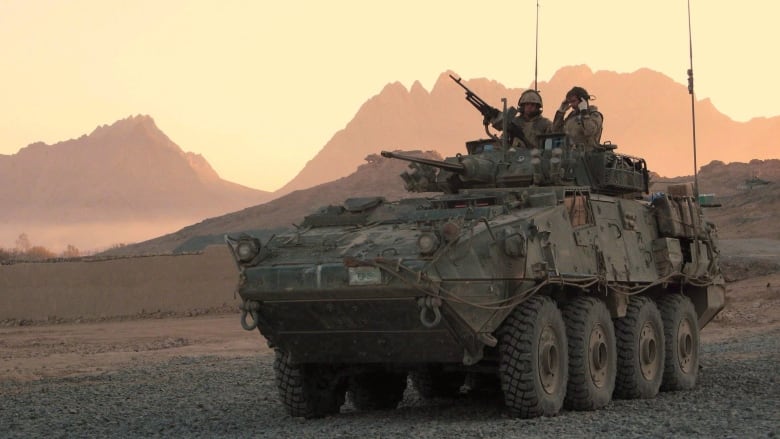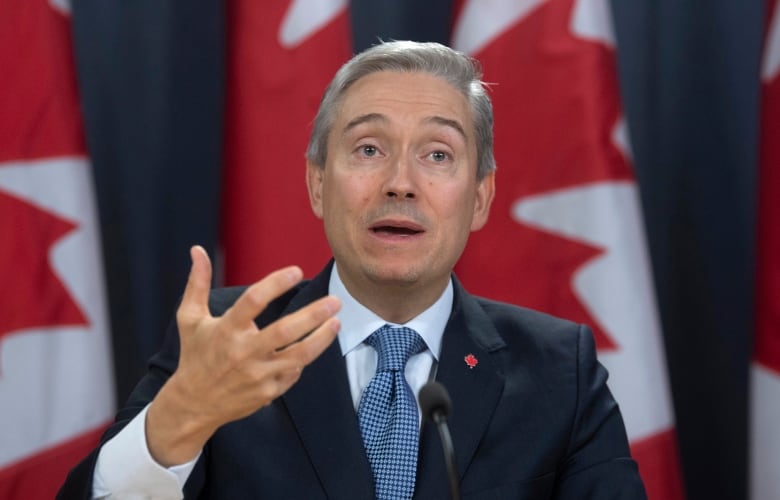Liberals lack 'courage' to end Canada-Saudi LAVs deal, says law prof
'There's something really wrong about the way this government has handled this issue,' says ex-MP Daniel Turp

Daniel Turp says he's disappointed with his former law student for not having "the courage" to end Canada's trade deal with Saudi Arabia.
He's referring to Foreign Affairs Minister François-Philippe Champagne, who announced Thursday that Canada has renegotiated its $14-billion agreement to sell light-armoured vehicles to the Kingdom.
In addition to the renegotiated LAV deal, the government announced it is also lifting a moratorium on considering new military export permits to Saudi Arabia. The pause was put into place in 2018 after the brutal murder of Saudi journalist Jamal Khashoggi.
Turp is challenging the deal in federal court, arguing that it contravenes the Arms Trade Treaty, of which Canada is a signed state party, and which aims to "address the poorly regulated international arms trade."
Saudi Arabia leads the coalition waging war in neighbouring Yemen — a conflict the United Nations has called "the worst humanitarian crisis in the world."
Champagne declined a request for an interview. Turp, a Université de Montréal law professor and former Bloc Quebecois MP, spoke to As It Happens host Carol Off. Here is part of their conversation.
Canada says it has negotiated better terms for this LAV contract with Saudi Arabia. Does that satisfy you?
Not at all, and especially [because] we don't really know the terms. When the minister announced there were amendments of the contract, he didn't really provide us with those amendments.
Again, the issue of transparency of a contract that has to deal with not only the economic issues, but human rights issues, is something that we don't really know about. So that's not satisfactory at all for me.

We've had very few details about this contract for these LAVs from the very beginning. But we now know that the government says that cancelling this light-armored vehicle contract would cost up to $14 billion in penalties. So did the Canadian government really have a choice?
It had a choice. The Canadian government had the choice not to enter that deal to begin with. The Conservative government should never have entered that deal to begin with because it's a deal with Saudi Arabia, and Saudi Arabia's the worst country of the world when it comes to human rights.
The Liberals, you know, they also had a choice not to deliver those export permits that the Conservatives hadn't delivered.
I believe that Canada could have been able to get out of that deal without paying penalties.
The Canadian government is citing this review that it made public last September where they found apparently no credible evidence linking Canadian exports of military equipment or any controlled goods to Saudi Arabia that had contributed to ... human rights violations. So does that report ... figure into this?
That memorandum of information really doesn't say much about the standards that Canada applied to determine that there was no risk.
What's interesting is that in other countries ... there have been studies suggesting that there are risks. There has even been in Belgium a case where the State Council ... has asked the government to suspend the export of arms to Saudi Arabia because the evaluation of risk had not been made properly, according to that court, by the country.

There are two parts to this announcement we've just heard from the federal government. One is the LAV contract will go ahead, but also they are lifting a moratorium on new permits for military exports to Saudi Arabia, and will look at them on a case-by-case basis. What do you make of the timing of this announcement?
It was quite startling to have an announcement just before the Easter or Passover break, you know, as if they wanted this not to be well-known or read or have people be interested by this news.
And the idea of doing this during this current coronavirus outbreak is something that is really very, very indecent, in my opinion. And there was no need to do that right now, although ... those amendments apparently were adopted on March 31.
There's something really wrong about the way this government has handled this issue and these contracts and now these amendments. It's quite hypocritical, you know, when it comes to what it has said about Saudi Arabia and its record on human rights with what has happened with Mr. Khashoggi's murder, with what's happening with women in Saudi Arabia and [jailed Saudi blogger Raid] Badawi.

We also, though, as you know, are in the middle of not just a health crisis, but an economic one. With penalties of up to $14 billion for canceling the contract, jobs lost from not making those LAVS, can this government afford to do otherwise, financially or politically?
The current government of Canada should just decide not to pay those penalties. And it would be for Saudi Arabia to try to get Canada to pay those penalties.
And what about the job losses?
The government should try to find a way to get those workers in London and elsewhere to find other jobs in other areas, not jobs to build LAVs that will destroy lives of children in Yemen and other people in that war, which has made so many casualties amongst civilians and maybe in Saudi Arabia.
The minister who is signing off on this, François-Philippe Champagne, is the latest of the political ministers who have had this file, and it's a hot potato. If you could speak to Champagne directly, what would you say to him?
I'd tell him to begin with, I'm not very proud with my former student. Because he's my former student in my classroom at the Université de Montréal. But just like Stéphane Dion before him and other ministers, he just doesn't have the courage to put an end to this deal.
And he hasn't the courage to tell [Prime Minister] Justin Trudeau and the members of the government that this should be over and Canada should have done like many other countries have done — suspend the export of arms to Saudi Arabia or even end the exports to a country that is the worst country in the world when it comes to human rights.
A lot of people would have expected that the Liberal government put an end to this, but it didn't. And a lot of people will go on saying that this is unacceptable.
And I will continue my role before the courts to try to get a judge to tell the government that there are risks. And because there are risks [and] human rights could be breached, this contract and these exports should cease.
Written by Sheena Goodyear. Interview produced by Jeanne Armstrong. Q&A has been edited for length and clarity.